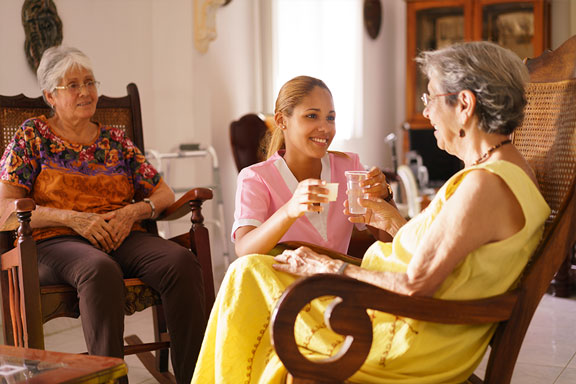
Personal Attendant Services (PAS) / Provider Services
Personal Attendant Services (PAS), also known as provider services, are non-medical assistance programs designed to help individuals with disabilities, chronic illnesses, or age-related challenges maintain independence in their homes and communities. PAS is primarily focused on assisting with activities of daily living (ADLs) and instrumental activities of daily living (IADLs) to enhance the quality of life and promote dignity.
Services Offered by PAS:
- Personal Care Assistance:
- Bathing, dressing, grooming, and toileting.
- Mobility support, including transferring and repositioning.
- Household Support:
- Light housekeeping, laundry, and meal preparation.
- Running errands and shopping for essentials.
- Medication Assistance:
- Providing reminders to take medications as prescribed.
- Companionship and Emotional Support:
- Offering companionship to reduce isolation and loneliness.
- Transportation Assistance:
- Helping individuals travel to medical appointments, social activities, or errands.
Benefits of PAS:
- Promotes Independence: Helps individuals remain in their homes rather than moving to a long-term care facility.
- Improves Quality of Life: Provides personalized care and support tailored to the individual’s needs.
- Relieves Caregiver Burden: Offers respite for family caregivers by sharing caregiving responsibilities.
- Cost-Effective: A more affordable option compared to institutional care or hiring full-time nursing staff.
Who Qualifies for PAS?
- Individuals with a physical, intellectual, or developmental disability.
- Seniors who need assistance with daily activities due to aging.
- Patients recovering from surgery or managing chronic conditions.
Eligibility for PAS often depends on state-specific Medicaid programs, long-term care insurance, or private pay options.
What is meant by Activities of Daily Living?
(PAS) Personal Assistance Services attendants assist with the following:
- Bathing
- Dressing
- Feeding/Eating
- Grooming, Shaving or Oral Care
- Routine Hair/Skin Care
- Toileting
- Transfer
- Cleaning
- Laundry
- Walking
- Meal Preparation
- Escort
- Shopping
- Assist with self Medication
Respite Care in Personal Attendant Services (PAS)
Respite care is a service within Personal Attendant Services (PAS) designed to provide temporary relief for family caregivers who care for individuals with disabilities, chronic illnesses, or age-related challenges. It allows caregivers to take a break from their responsibilities while ensuring their loved ones receive safe, professional care in their absence.
Personal Attendant Services are a vital resource for those who need help with daily living activities, allowing them to maintain their independence and dignity in the comfort of their homes.
Other programs under PAS: Family PCS and CAS
To qualify for CAS (Community Attendant Services) an Individual must:
- Have multiple physical limitation
- Have partial Medicaid (QMB) and Medicare
- Be approved by the State of Texas
- Be approved by a physician
To qualify for PCS (Personal Care Services) an individual must:
- Be a child with disabilities from 2 to 21 years of age
- Have full Medicaid (MQMB) or Traditional Medicaid
- Be approved by the State of Texas
- Be approved by a physician
Private Duty or Private Pay in Home Care Provider Services
Private duty home care, often referred to as private pay home care, involves personalized, non-medical care services that individuals or families pay for out-of-pocket. These services are tailored to meet specific needs and preferences, offering flexibility and convenience for individuals who require assistance with daily living but may not qualify for government-funded programs or prefer to supplement existing care.
Key Features of Private Duty Home Care:
- Personalized Care:
- Services are customized based on the client’s specific needs, such as help with bathing, dressing, meal preparation, or companionship.
- Flexible Schedules:
- Care can range from a few hours a day to 24/7 live-in support, depending on the individual’s requirements.
- Professional Caregivers:
- Services are provided by trained caregivers, including personal care aides, certified nursing assistants (CNAs), or even licensed nurses for higher-level care needs.
- Non-Medical and Basic Medical Support:
- Non-medical care focuses on daily living assistance.
- Some agencies also offer basic medical tasks like medication reminders or mobility support.
- Private Payment:
- Unlike Medicare or Medicaid-funded programs, private duty care is paid for directly by the client or family.
- Long-term care insurance or Health Savings Accounts (HSAs) may help offset costs.
Services Offered:
- Assistance with activities of daily living (ADLs) such as bathing, grooming, and dressing.
- Light housekeeping, laundry, and meal preparation.
- Transportation for errands, appointments, or social activities.
- Companionship to reduce isolation and loneliness.
- Specialized care for conditions like Alzheimer’s or Parkinson’s (in some cases).
Benefits of Private Duty Care:
- High Flexibility and Control:
- Clients can choose the exact type of care they need, when they need it, and how frequently.
- One-on-One Attention:
- Personalized care ensures the highest level of attention and responsiveness to the client’s needs.
- Enhanced Independence:
- Allows individuals to remain in the comfort of their own homes while receiving support.
- Peace of Mind for Families:
- Families can rest assured knowing their loved ones are well-cared-for by professional caregivers.
- Immediate Access to Care:
- No waiting periods or eligibility requirements, unlike government programs.
Who Benefits from Private Duty Care?
- Seniors wanting to age in place.
- Individuals recovering from surgery or illness.
- People with disabilities needing additional support.
- Families seeking respite from caregiving duties.
Private duty home care provides a flexible, personalized solution for individuals needing assistance at home. Though privately funded, it offers unmatched convenience, quality, and peace of mind for both clients and their families.
FC (Family Care) is a Federal Funded Program, these programs, PHC, CAS, PCS, and FC can be paid for through insurance or private pay.
(Call for more information) Learn more on the benefits of Primary Home Care care today! Call toll free at (877) 277-2939.
